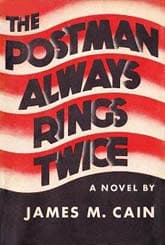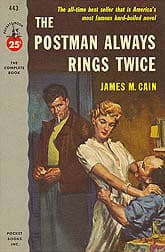The Postman Always Rings Twice
Critique • Quotes • At the movies
 First edition
First editionFirst publication
1934, United States
Literature form
Novella
Genres
Literary, crime
Writing language
English
Author's country
United States
Length
Approx. 38,000 words
Postman keeps ringing true
What a debut. The Postman Always Rings Twice was James M. Cain's first novel, published relatively late in life for a writer, when he was in his forties. But already his writing is as tight and intense as any work of the past and future masters of the hardboiled style. The book's spare and unsparing text most reminds me—although its subject matter is much different—of Dashiell Hammett's mystery classic The Glass Key.
Paired with the serial publication of Double Indemnity a couple of years later, Postman established Cain as one of the foremost crime writers of his—and our—time. The hardboiled label and the film noir adaptations of his early writing have established his reputation as that kind of writer forever, it appears, despite much of his subsequent work having little to do with crime or detectives. (See Mildred Pierce, for example.)
In light of this, it's interesting to note neither The Postman Always Rings Twice nor Double Indemnity is a mystery. In both cases, the protagonists plot to kill for love (or lust) and money, with the readers' full awareness every step of the way. These are suspense stories, if anything, as we follow through the fateful attractions of the male and female leads, through every stage of their conspiracy to commit perfect murders, and—most importantly in a Cain novel—through the aftermath as they try to avoid detection or punishment.
Most of the other elements of the hardboiled genre are there. The dark passions. The heroes of dubious morality—or amorality—in a hardscrabble world. The cynical take on respectable society. The sudden, squalid violence. The retribution.
In The Postman Always Rings Twice, Frank Chambers functions as an odd regular-guy kind of everyman. He's a drifter and a grifter, sure, but not great at either occupation. He hustles in poolrooms to make a few bucks along the way, but he also gets taken himself. His illicit paramour, Cara Papadakis, is good enough looking to get a screen test but she's no Lana Turner. What draws them together seems to be that they recognize each other as being no good.
There's also a strain of sadomasochism in the relationship that seldom gets mentioned by critics but is hinted at in Frank's description of her as having lips "that made me we want to mash them in for her" and her repeated imprecations to him to bite and rip her. Mild stuff today, but they imply in the language of that time something beyond spicy lovemaking.
By the end of their relationship, they are open-eyed about their failings not only as human beings but as lovers. Each has betrayed the other more than once. They no longer have that unadulterated passion they'd had in the beginning, but, as Frank says, they're "chained together". He tells her:
"I love you, Cora. But love, when
you get fear in it, it's not love any more. It's hate."
"So you hate me?"
"I don't know. But we're telling the truth, for once in our
life."
The accommodation they reach, as they plan what they expect to be a long future together, is little different from that of many experienced couples—though presumably without murder in their past activities. It's usually the world-weary but wiser outlook of a person approaching middle-age, like the author, rather than of the young adults of the story.
Drinking it in
A funny thing happens when you get a novel like The Postman Always Rings Twice (techically a novella, actually) that is so easy to read but so sharply worded. You actually slow down in reading it—to make sure you take in every significant word. Which is every word.
And when you're done, you don't think "Well, that was short" and move on to something else right away. Rather you sit with it for a while, make sure you've drunk it all in. Have a real drink maybe. Then carry it around with you for a long, time. (The story, that is, not the drink.)
Much has been made of the seemingly non-sequitur title. No postman, ringing or otherwise, appears in the book. Cain has revealed a rather prosaic explanation of where he got the idea for the title, but we don't need that. On one level, it fits in with the ironical denouement of Frank's escapades by which he is justifiably punished for the wrong crime.
But on another level, at the level of the reader who carries it around in the head afterwards, it makes perfect sense. Twice? That's understating it.
— Eric
Critique • Quotes • At the movies


